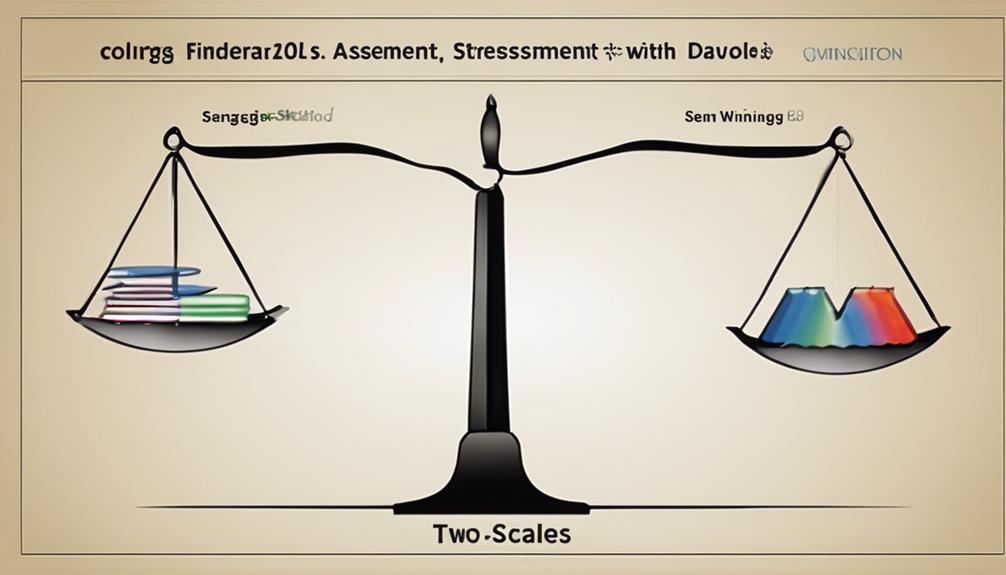As we navigate through the complex maze of human behavior, we frequently encounter a fascinating occurrence referred to as narcissistic projection. This defense mechanism, enveloped in layers of intricacy, provides insight into the complex inner workings of the human mind.
By peeling back the layers of projection, we begin to unravel a web of insecurities and defenses that shape our interactions and perceptions.
Join us as we dissect the intricacies of narcissistic projection, shedding light on how it influences personal dynamics and emotional well-being.
Key Takeaways
- Narcissistic projection is a defense mechanism involving externalizing insecurities onto others.
- Recognize projection as a window into the narcissist's true self.
- Detachment is crucial in handling projection effectively.
- Avoid engaging in debates or justifications when faced with projection.
Definition and Characteristics
Narcissistic projection, a defense mechanism commonly observed in individuals with Narcissistic Personality Disorder, involves externalizing their insecurities onto others. This behavior allows them to avoid confronting their own flaws by attributing them to someone else.
By projecting their negative traits onto others, narcissists maintain a facade of superiority and perfection. It can be challenging to navigate relationships with individuals who exhibit this behavior, as projection often leads to confusion and emotional distress for those on the receiving end.
Understanding the dynamics of projection is crucial in establishing boundaries and preserving one's emotional well-being. Recognizing when projection occurs can serve as a tool for self-protection and maintaining healthy relationships with individuals who struggle with Narcissistic Personality Disorder.
Psychological Mechanisms at Play

Externalizing their insecurities through projection allows individuals with Narcissistic Personality Disorder to maintain a facade of superiority and perfection, revealing intricate psychological mechanisms at play. This behavior stems from deep-rooted issues within the individual, shaping their interactions and relationships.
- Projection serves as a shield against self-awareness.
- It projects a false image of strength and control.
- It deflects attention away from their vulnerabilities.
- It reinforces their distorted self-view.
- It perpetuates a cycle of denial and blame shifting.
Recognizing Narcissistic Projection
Recognizing patterns of projection in individuals with Narcissistic Personality Disorder can provide valuable insights into their defensive strategies and underlying insecurities. It involves projecting their own negative traits, feelings, or beliefs onto others.
By observing how they accuse others of behaviors they exhibit or blame others for their actions, we can begin to unravel the complexities of their psyche. This recognition serves as a mirror reflecting their inner turmoil and fragility.
Understanding this defense mechanism enables us to navigate interactions with greater awareness and compassion. It sheds light on the insecurities driving their behavior and allows us to maintain healthier boundaries.
Recognizing narcissistic projection unveils a deeper understanding of the individual and their struggles.
Impact on Relationships and Dynamics

Understanding the impact of narcissistic projection on relationships and dynamics reveals the intricate web of manipulation and emotional turmoil that can ensue. When dealing with narcissistic projection in relationships, it's essential to be aware of how it can disrupt the dynamics and foster toxic environments. Here are some key points to consider:
- Erosion of trust and intimacy
- Creation of power imbalances
- Emotional manipulation and gaslighting
- Increased conflict and tension
- Undermining of individual identities
Navigating these challenges requires a deep understanding of narcissistic behaviors and their effects on interpersonal connections. By recognizing these patterns, individuals can begin to address and mitigate the destructive impact of narcissistic projection on relationships.
Coping Strategies for Individuals
When navigating the challenges of coping with narcissistic projection, individuals can empower themselves by prioritizing self-care and setting firm boundaries. It is essential to establish practices that promote emotional well-being and protect oneself from the negative effects of projection. Here are some effective coping strategies:
| Coping Strategy | Description |
|---|---|
| Self-compassion | Cultivating kindness and understanding towards oneself |
| Boundary Setting | Clearly defining limits and enforcing them |
| Seeking Support | Reaching out to trusted individuals or professionals |
Addressing Projection in Parenting

Parenting involves navigating complex dynamics, and addressing projection within this context requires a deep understanding of its impact on familial relationships.
- Creating Emotional Awareness: Recognizing signs of projection in parental behavior.
- Promoting Open Communication: Encouraging honest dialogue to address projection issues.
- Setting Boundaries: Establishing clear limits to prevent projection from affecting children.
- Modeling Healthy Behavior: Demonstrating self-awareness and accountability as a parent.
- Seeking Support: Reaching out to therapists or support groups for guidance in dealing with projection dynamics.
Professional Intervention and Support

Navigating the complexities of addressing projection within parenting dynamics may lead individuals to seek professional intervention and support to facilitate a healthier familial environment. Seeking help from mental health professionals can provide valuable insights and strategies to cope with narcissistic projection. Below is a table outlining potential professional interventions and support for individuals dealing with this challenging issue:
| Professional Intervention | Support Offered |
|---|---|
| Therapy/counseling | Individual or family sessions to address specific concerns and develop coping mechanisms. |
| Support groups | Connecting with others who have experienced similar situations for empathy and guidance. |
| Parenting classes | Learning effective parenting strategies and communication techniques. |
| Child therapy | Providing children with a safe space to process emotional trauma and develop resilience. |
| Co-parenting mediation | Facilitating healthy communication and conflict resolution between parents for the well-being of the children. |
Healing From Narcissistic Abuse

Healing from narcissistic abuse requires a deliberate and compassionate approach towards rebuilding emotional resilience and establishing healthy boundaries. It's a process that demands patience, self-reflection, and support from others who understand the complexities of such experiences.
- Self-Reflection: Taking time to understand our own emotions and responses.
- Therapeutic Support: Seeking professional guidance to navigate the healing journey.
- Validation: Finding validation in our experiences to counter gaslighting effects.
- Boundaries: Setting clear boundaries to protect oneself from further harm.
- Self-Care: Prioritizing self-care activities that promote healing and well-being.
Building Emotional Resilience

Building emotional resilience involves developing coping mechanisms to navigate through challenging situations and bounce back from adversity with strength and adaptability. One way to enhance emotional resilience is by practicing self-care routines, engaging in mindfulness activities, and seeking support from trusted individuals. These strategies can help in fostering a sense of inner strength and emotional stability during difficult times. Additionally, setting boundaries, acknowledging emotions, and reframing negative thoughts can contribute to building resilience. By actively working on these aspects, individuals can cultivate a resilient mindset that allows them to face adversities with courage and determination.
| Strategies for Building Emotional Resilience | Examples |
|---|---|
| Practice self-care routines | Exercise, meditation |
| Engage in mindfulness activities | Yoga, deep breathing |
| Seek support from trusted individuals | Friends, family members |
| Set boundaries and acknowledge emotions | Journaling, therapy |
Frequently Asked Questions
Can Narcissistic Projection Be Unlearned or Changed Through Therapy and Self-Awareness?
Yes, therapy and self-awareness can help unravel narcissistic projection. By fostering introspection and challenging maladaptive patterns, individuals may unlearn projection. With professional support and personal growth, change is achievable in breaking destructive defense mechanisms.
How Can Individuals Differentiate Between Healthy Self-Reflection and Narcissistic Projection in Their Own Behavior?
In healthy self-reflection, we introspect without blaming others, seeking growth and understanding. Narcissistic projection involves attributing our flaws onto others to avoid responsibility. Recognizing our motives and reactions helps differentiate between the two behaviors effectively.
Is There a Genetic Component to Narcissistic Projection, or Is It Solely a Learned Defense Mechanism?
There may be a genetic predisposition to narcissistic projection, but it primarily stems from learned behavior. Understanding both aspects can aid in addressing and managing this defense mechanism effectively, fostering personal growth and healthier relationships.
What Role Does Empathy Play in Breaking the Cycle of Narcissistic Projection in Relationships?
Empathy breaks the cycle of narcissistic projection in relationships by fostering understanding and connection. It allows us to see beyond the projection, empathize with the narcissist's pain, and set boundaries from a place of compassion.
Are There Cultural or Societal Factors That Contribute to the Prevalence of Narcissistic Projection in Certain Populations or Communities?
In certain populations or communities, cultural and societal factors can fuel the prevalence of narcissistic projection. These influences shape perceptions, values, and behaviors, impacting how individuals externalize insecurities onto others as a defense mechanism.
How Does Narcissistic Fury Relate to Narcissistic Projection?
Narcissistic fury is closely linked to narcissistic projection. When individuals with a narcissistic fury mindset are unable to accept criticism or rejection, they project their anger onto others. This allows them to avoid facing their own insecurities, maintaining their self-image. Understanding these insights is crucial in dealing with individuals with a narcissistic mindset.
Conclusion
In the intricate dance of human behavior, understanding narcissistic projection unveils a world of psychological defenses. Like a tangled web, projections mirror the accuser's own insecurities, shaping relationships and dynamics.
By recognizing and addressing this defense mechanism, we equip ourselves with the tools to navigate its challenges. As we unravel the layers of projection, we not only heal from narcissistic abuse but also build emotional resilience to face the complexities of human interactions.









